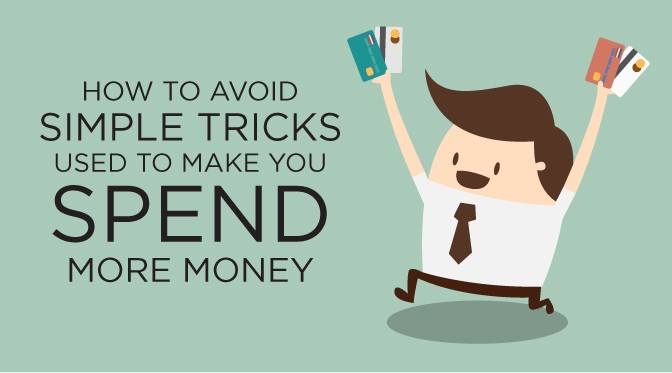Paying with cash is so prehistoric—in today’s world, plastic is ubiquitus. Cashiers almost look surprised if you hand them green paper in exchange for your groceries. Why do you think our mindset has shifted so drastically in this direction? Believe it or not, a lot of psychological marketing goes into the way you pay. The evolution of paying with cash to check, card, chip, and now mobile services (like PayPal, Venmo, and Square) is no accident—and these services aren’t necessarily doing you a favor. The easier a vendor can make it for you to pay, the more likely you are to over-shop and over-pay.
It’s a fact, if marketers can get you to pay with anything other than cash, you will spend more money.
According to the article “Cards Encourage You to Overspend” on Soundmoneytips.com, people will spend more with a credit card compared to cash. In fact, a Dunn & Bradstreet study found that people spend 12-18 percent more when using credit cards than when using cash. And in a dramatic study McDonald’s found that the average transaction rose from $4.50 to $7 when customers used plastic instead of cash (Source: Investopedia). That’s 36% more!
On the flip side, when you pay cash you feel more responsibility to use your money wisely. It psycologically pinches more to hand the cashier a $20 bill than it does to swipe that credit card. When you pay cash, you literally watch your money dwindle. And that helps you make more intelligent decisions about spending.
It’s a psychological effect that takes no effort on your part, simply use cash more and you will spend less.
Let’s look at another example that uses similar psycological principles to save money on healthcare costs. The CEO of Whole Foods, John Mackey, has successfully lowered the companies healthcare costs just by changing the way their employees view their healthcare dollars. What he’s done has made employees “feel” like they are spending their own money on healthcare and not the company’s money.
The Whole Food’s consumer-driven health plan is gaining nation-wide attention as a strategy for reining in insurance costs. The employee healthcare plan is essentially this:
- • Low premiums with high deductible with 100% paid after the deductible is met
- • Whole Foods contributes from $300 to $1,800 per year to an HSA account (carried over to the next year)
- • Employee pays medical bills with their HSA
The results have been dramatic. Employees feel like they are spending their own money for healthcare, and it is encouraging them to take responsibility for cutting costs by buying generic drugs, asking for fee waivers on lab tests and other procedures, and keeping a closer eye on what doctors charge for their services. Employees have more of a financial stake in what they pay for medical care, and it shows.
We want to show you how to apply this same logic to your large purchases, and see a dramatic improvement in your finances. The best part is it doesn’t take a massive effort on your part to work. By simply changing the way you finance these purchases you will naturally save money.
When you borrow money from a bank or other creditor, you are essentially putting that car, house renovation, or vacation on a credit card—you are paying using someone else’s money. You’ll ultimately pay it back, but you won’t analyzing your decisions with the same scrutiny as if you were paying cash. If you use someone else’s money, it’s been proven that you will be less likely to think about ways you could save money or the total amount you’ll pay for that car. You will only be thinking about the monthly payment you’ll make to return that money (plus interest).
In our free eCourse called Infinite 101®, we show you how to borrow money from yourself and pay yourself back. This simple change in how you finance things automatically brings careful discernment back to your spending; especially for your large purchases. Like spending 36% more at McDonald’s, you won’t even notice it’s happening and you’ll be saving money.
Finally, let’s look at how these same principles come into play with your 401(k) and mutual funds. When it comes to investing, we emphasize the principle of stewardship with your money. You work very hard to earn it and often when investing and saving, you turn around and hand large amounts of it to someone else assuming safekeeping and growth.
Here’s what happens when you give your money to a broker to “grow” in a 401(k) or IRA:
- • You automatically think less about what your money is doing
- • You lose acces to the money
- • You lose purchasing power
- • You place it in a volitile environment for 30 years
Oh, and the tax you’re avoiding? You’ll pay that when you take it out. Your million-dollar 401(k)may become $750,000. And if purchasing power decreases at the same trajectory over the next 30 years, it may even drop to $375,000. We’re confident when we tell you that if you put your money into mutual funds, you’ll never gain back the losses.
We’re not going to tell you all of this without providing a solution. Let us tell you about infinite banking—a completely different financial strategy where you purchase whole life insurance with a cash addition. Then you can borrow money from yourself (that you’ve already earned and saved) and pay yourself back. It’s the closest way to “pay cash” for very large purchases—even your house—without actually paying cash. When you borrow from yourself, you are going to make sure you’re making the most of your money and make thoughtful, intelligent decisions. We believe you’ll get as much value out of your money as possible, because stewardship ignites ingenuity.
We know you want more details, and we have a commitment to providing financial education. Take 2 minutes to sign up for a FREE, extensive eCourse called Infinite 101®. You’ll receive access to video tutorials, articles, and podcasts. It literally costs you nothing to become educated on this ideal strategy and start changing your wealth paradigm!
Take advantage of this FREE resource by clicking below.









